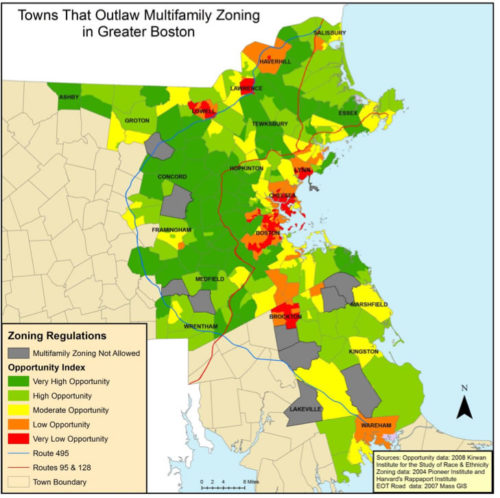We know that the majority of the very wealthy are very keen to keep that wealth going, for themselves and their descendants, even if they don’t actually need to be so wealthy.
A key form of storing that wealth (and removing it from the cyclical economy) is property. Often the family home is a key asset, because typically it won’t attract capital gains tax – it my home, not an investment!
So in many districts of the US, zoning laws are in place to make sure that only expensive, single family buildings can exist, even when multi-family buildings – apartment buildings of any size – would be economically viable. This is against the nature of free capitalism, and more akin to authoritarianism.
The American Prospect reports:
Exhibit A is exclusionary zoning, which outlaws the construction of duplexes, triplexes, and apartment buildings—housing that is more affordable for working-class families, many of them families of color—in affluent areas.
…In the 1970s, residents of Boston made national headlines for violently resisting school desegregation.
…Almost 50 years later, exclusion remains pervasive in the Boston area. In Wellesley, for example, which was home to the federal judge who ordered school desegregation, and where three-quarters of voters supported Joe Biden over Donald Trump in 2020, the population remains just 2.9 percent Black and 5.1 percent Hispanic. The median household income is $197,132.
…In the relatively diverse city of Cambridge (median household income of $103,154), for example, the zoning code states that the minimum lot size for multifamily housing is 900 square feet, while 15 miles away, in Weston (median household income of $207,702), the multifamily minimum lot size has been set at 240,000 square feet, some 267 times higher than Cambridge’s.
That’s 5.5 acres. There’s no logic behind such a rule.
The article cites other examples. Thankfully there is a chance that Biden can improve things, as the US slowly removes barriers to equality:
Comments closedThe House-passed version of the Build Back Better Act provides $1.75 billion for Unlocking Possibilities, a first-ever federal race-to-the-top program to provide incentives for states and localities to remove the exclusionary zoning policies that segregate Americans by race and class and make housing less affordable for everyone.
